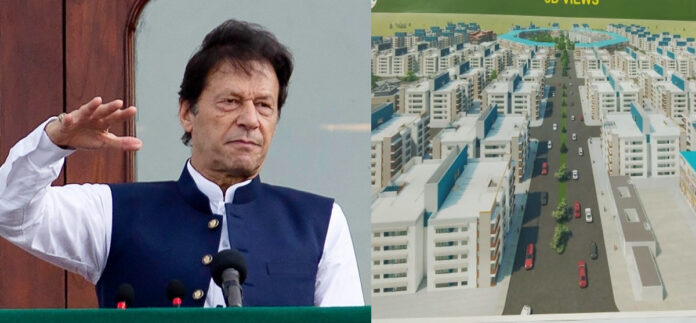ISLAMABAD: Prime Minister Imran Khan on Thursday performed the ground-breaking of the low-cost housing units in the capital’s Farash Town, with 600 out of 4,000 apartments to be given to slum dwellers.
Another 2,000 flats will be allotted to those who had registered themselves under the Naya Pakistan Housing Programme, while 1,600 flats will be sold out on an open market basis by Capital Development Authority (CDA).
Prime Minister Imran Khan witnessed the Memorandum of Understanding (MoU) signed among the Naya Pakistan Housing Development Authority (NPHDA), Capital Development Authority (CDA) and Frontier Works Organization (FWO), which will jointly carry out the project.
Speaking on the occasion, Prime Minister Imran said the project aimed at providing shelter to the underprivileged segment of society, particularly the working class and labourers.
Imran Khan said within a time frame of two years, people would be able to move into the houses with ownership rights.
He expressed satisfaction that regular negotiations of the government with private banks, the Federal Bureau of Revenue (FBR) and relevant bodies resulted in an agreement on mortgage financing as the key factor in the materialization of the project.
He said existing impediments in acquiring bank loans would be sorted out and the procedure would be simplified in consultation with banks.
The prime minister said in near future, CDA would be working on a plan for the development of all slum areas in the capital with the provision of modern amenities.
Prime Minister Imran Khan said the government was focusing on projects with a target of wealth creation to pay off heavy debt borrowed by the previous rulers.
He mentioned that the government’s incentives for the construction industry would not only ensure economic activity with the running of 30 affiliated industries but also generate employment opportunities.
He expressed confidence that the development of Lahore’s Ravi Urban Project and Central Business District (CBD) and Sindh’s Bundal Island would attract foreign investment.
Also, the textile industry witnessed a boom with the operationalisation of power looms, leading to an increase in demand for workers, he added.
He said the construction of two big dams after five decades would ensure cheap electricity and contribute to enhanced productivity of industries.
Imran Khan said completion of Main Line-1 rail track would reduce the Lahore to Karachi travel time to eight hours, and also benefit the freight movement as a factor of ease of business.
Interior Minister Sheikh Rashid Ahmed said the occasion was food for thought for the ‘inhabitants of Surrey Palace and Park Lane Apartments’, who never considered the fact that poor people also needed shelter.
He announced that in the upcoming Media City, 600 flats would be provided to the journalists of Islamabad and Rawalpindi, for which he said, he had convinced Chief Commissioner of Islamabad Amer Ahmed Ali and Deputy Commissioner Hamza Shafqat.
However, he made it clear that the flats for journalists “would not be free-of-cost and the required instalments would have to be paid”.
Under the Safe City project, he said, 1,822 surveillance cameras had made operational compared to the 500 during the tenure of the previous government. Also, 1,200 more CCTV cameras will be purchased to make the city secure.
Chairman Naya Pakistan Housing Development Authority General (r) Anwar Ali Hyder said 2,000 persons already registered with the project would be allotted flats through ballot after proper verification of NADRA.
He said mortgage financing on the lowest markup through banks and Rs 300,000 subsidy by the government would enable the low-income groups to have their own homes.
Later, the premier also planted a sapling at the construction site of Farash Town Apartments. PM’s Special Assistant for Overseas Pakistanis Syed Zulfikar Bukhari and Senator Faisal Javed were present.




